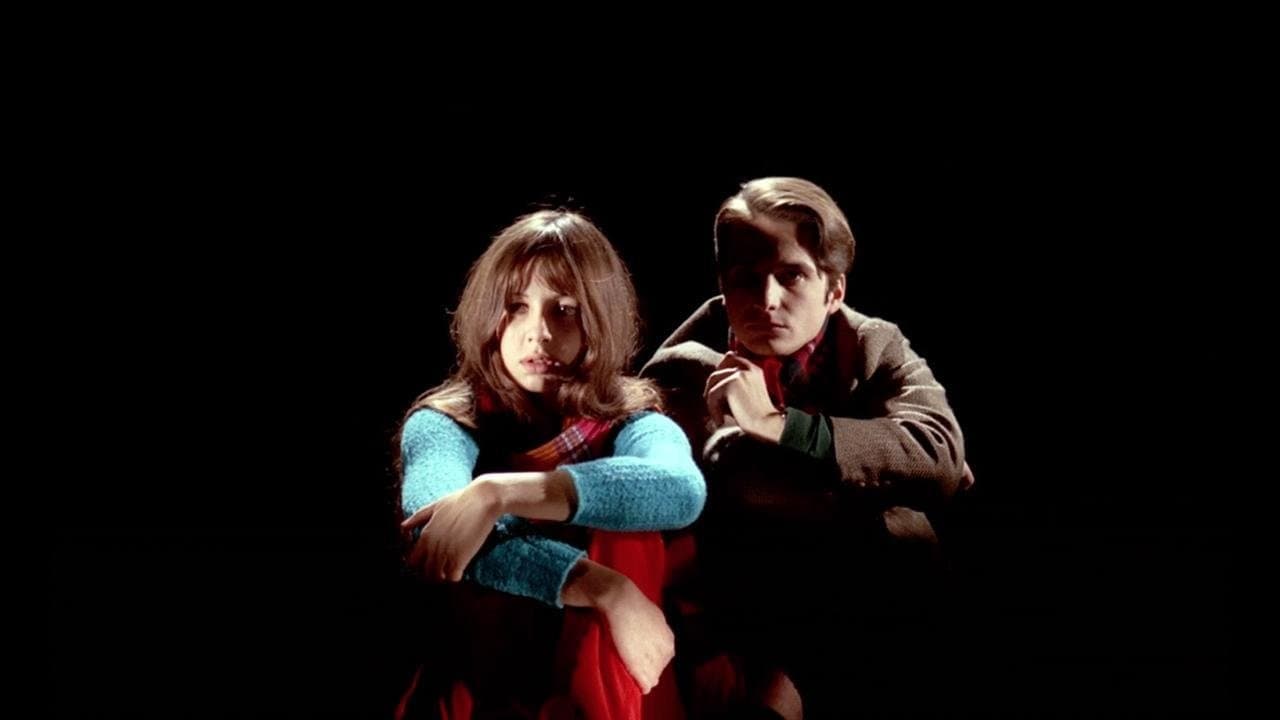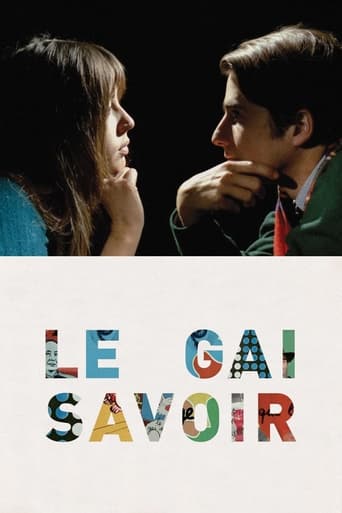

Night after night, not long before dawn, two young adults, Patricia and Emile, meet on a sound stage to discuss learning, discourse, and the path to revolution. Scenes of Paris' student revolt, the Vietnam War, and other events of the late 1960s, along with posters, photographs, and cartoons, are backdrops to their words.The shooting started before the events of May 68 and was finished shortly afterwards. Co-produced by the O.R.T.F., the film was upon completion rejected by French national television, then released in the cinema where it was subsequently banned by the French government. The title is a reference to Nietzsche's book "The Gay Science".For me, this film just further cements the weirdness that is Godard. He is something of a cinematic anarchist, throwing just about any picture or sound he wants on the screen, and this seems to be a running theme of his throughout the 1960s. The extended scene where a child is playing a word association game -- what is that? Is that taken from another film, or did Godard actually include it for some sort of strange, revolutionary metaphor?
... View MoreAt one point in this cinematic essay (as someone close put it, not really a real storyteller Godard is here but an essayist with camera and sound), some still images pop up with Che Guevara speaking (I think it's Che), and it says that (to paraphrase) in order to be a true revolutionary one must love. I wonder how much love Godard really has to offer, or can really share through his film-making in the case of "The Joy of Learning" or Le Gai savoir. His film here, a capstone of his late 1960s work that started amazingly (La Chinoise and especially Week End with Sympathy for the Devil thrown in the mix) and ended with this, is cold and analytical and sometimes put together in such a way that I would need a professor in an advanced film and politics class to really get everything across in a class discussion. This is no longer a Godard who can communicate philosophical and poetic and political dialog through the means of cinematic entertainment and "CINEMA" (in caps and quotes), but an anarchist out to f*** with time and space and language... and only sometimes succeeding in my estimation.This doesn't mean that for some intellectuals or just those tuned into the socialist/Maoist revolutionary aesthetic may not have some enjoyment or tickling of the intellect here. Indeed there are some moments that even stick out amid the whole jambalaya of discourse and narration and non-sensible/incredulously self-indulgent diatribes by the two characters. But I was strangely more intrigued by the visual pattern more than the actual dialog and political ideas, wherein the two characters are placed amid a black background, minimal but striking and provocative lighting set-ups, and spliced-in still images of newspaper clippings and communist propaganda with a car's view of driving around a French city. It may be the strongest criticism of all that I connected more (and was wondering what his thinking was) to Godard as a director and editor than as a "screenwriter". So much of what's in here is only interesting in small bits and pieces as far as information goes, and has been presented better, more audaciously in other pictures (and with less satirical bite and bile than La Chinoise, possibly his masterpiece of political cinema), and I'm left with wondering how he did this or that or what his thinking was doing it then the actual ideas.But that's just me, your 'love most 60's Godard, usually bored or perplexed by everything after' movie-buff.
... View MoreIt has been almost twenty five years since I've seen this -- I saw it a couple times in the early 80s and I've never seen it available on tape or disk -- but I found it to be one of the most enjoyable lesson films from Godard. I though it was beautiful to look at, and quite funny in parts, and easy to follow. It IS extremely didactic -- but as the title says, there is JOY in learning. It's popping up in a Godard festival running at the Hammer Museum in June, on a double bill with Weekend, and I intend to check it out again. If I don't like it this time, I'll write again -- but I remember just totally digging this movie. The other writer here says that he didn't go to a Godard film for ten years he so disliked this -- but in my memory it was so joyous i wanted to see it again and again. hey -- maybe we're both right (or wrong).
... View MoreOne rather confusing film. Apparently deliberately so. I enjoyed it thoroughly though.Some of the themes seemed to be:May 68The inability to get rid of bourgeois societySexuality - as something that brings together but rips apartLanguage KnowledgeAs usually with Godard it's also an statement about film - and in this case more than usually. It ends with Godards voice-over over a completely black screen saying something like that this is not the film that should be made, but that all films that will be made should have something that is this film.
... View More